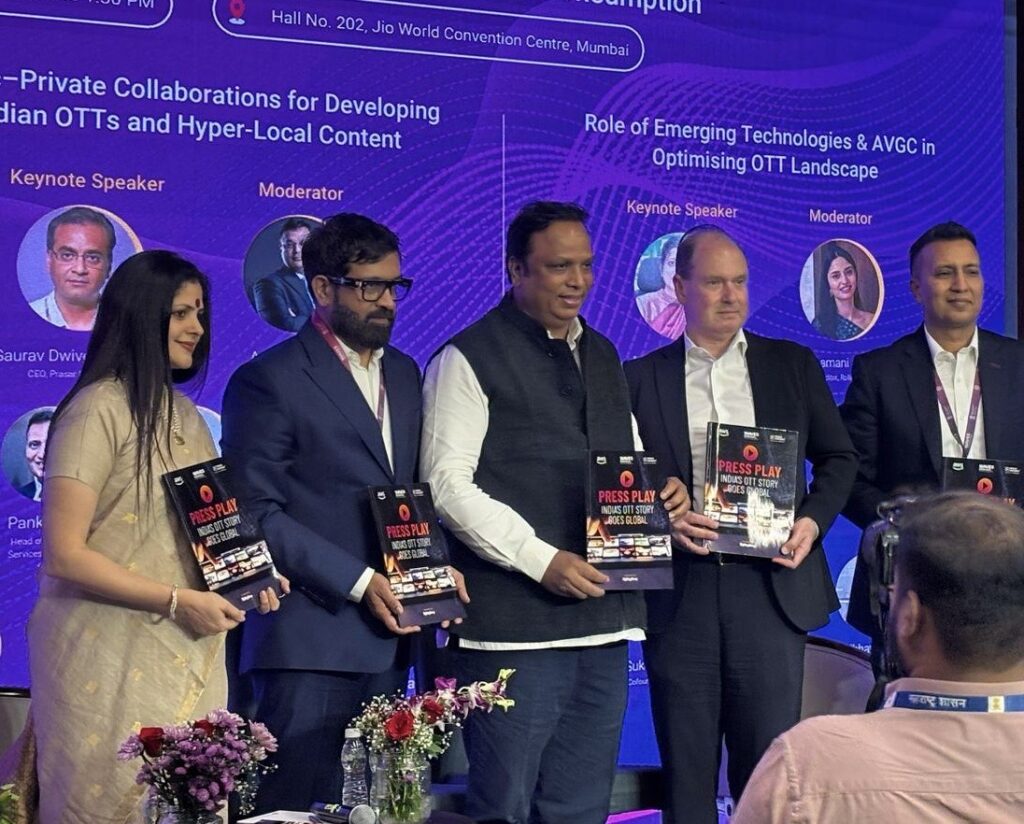
Photo courtesy of Primus Partners
It’s not just India’s screens that are getting bigger—it’s also its ambitions. At the WAVES Summit 2025 held at Mumbai’s Jio World Convention Centre, over a hundred voices from cinema, technology, public policy, and venture capital gathered to talk about what’s next for Indian OTT. Titled “OTT & Digital-Driven Democratisation of Content Creation and Consumption,” the roundtable was jointly curated by Primus Partners, AWS, and Rolling Stone India—and marked a major moment for the country’s fast-evolving digital entertainment economy.
The day kicked off with the launch of Press Play – India’s OTT Story Goes Global, a new industry report co-authored by Rolling Stone India, AWS, and Primus Partners. Unveiled by Maharashtra’s Minister for Culture, Heritage and IT, Ashish Shelar, the report highlights the rise of Indian OTT not just as a local force but as a global cultural export. “OTT today is not just about entertainment,” Shelar said, “it includes gaming, immersive content, and education. Maharashtra is proud to be the launchpad for this transformation.” He also announced plans for a Marathi OTT platform, as well as continued state support for creative entrepreneurs and digital innovation.
Prasar Bharati CEO Gaurav Dwivedi delivered a keynote address, reminding attendees of the public broadcaster’s historic role in shaping Indian narratives—from the days of Binaca Geet Mala on radio to Hum Log and Ramayan on TV. With the launch of WAVES OTT, Dwivedi said the goal is to break away from the constraints of linear broadcasting and offer a dynamic, multi-genre digital platform. “This is not just a platform for entertainment,” he said. “It’s an instrument of empowerment, where every voice from every corner of India gets to be seen and heard.”
Across three focused sessions, the roundtable addressed the ecosystem’s most urgent questions. How can India deepen public–private partnerships to scale hyper-localised content? What would it take for Indian stories to go global, not just culturally but commercially? And how are emerging technologies like AI, AR/VR, and cloud infrastructure transforming the way content is made, distributed, and monetised?
The panels featured a wide cast of industry voices—from creators and actors to founders and tech leaders. Sachin Pilgaonkar emphasized the need to stop labelling OTTs by region. “All OTTs in India are Indian—the only difference is the language,” he said. Actress Amala Akkineni called for a more institutionalised approach to mentoring regional creators, and stressed the need for dedicated funding to push vernacular storytelling into the global mainstream.
One of the day’s biggest announcements came in the form of a strategic MoU between the Government of Andhra Pradesh and Creativeland Asia to build Creatorland—India’s first transmedia entertainment city. The project aims to blend AI, gaming, immersive storytelling and global co-productions, and is projected to attract ₹8,000–10,000 crore in investment, create 150,000 jobs, and skill over 10,000 people each year. “Andhra Pradesh is ready to be a new-age hub for creative-tech,” said Amrapali Kata, MD of AP Tourism.
According to the announcement, Creatorland will be developed as a multi-purpose creative infrastructure project. It is expected to include a virtual studio complex equipped with AI-based real-time rendering and volumetric capture technology, immersive theme parks, gaming and esports zones, global cinema co-production spaces, and a skilling academy focused on VFX, AI, gaming, and immersive storytelling. Sajan Raj Kurup noted that the project is in conversation with more than 20 international studios regarding potential collaboration, and that the goal is to create a space that integrates advanced technology, global production partnerships, and locally driven content development.
At the announcement, Shri Kandula Durgesh said, “This MoU is part of our broader efforts to open Andhra Pradesh to new opportunities in entertainment tourism and digital media. Creatorland is intended to support both economic development and creative innovation.”
The presence of speakers like David Unger, CEO of Artists International Group, William Pfeiffer Executive Chairman and Co-Founder of Globalgate, Mahima Kaul, Director of Public Policy at Netflix India, Sameer Nair, CEO of Applause Entertainment, author Amish Tripathi, and actors Kriti Kharbanda and Isha Talwar underscored the cross-sector momentum behind India’s OTT push. Also spotted in the crowd were filmmakers and producers like Jayant Somalkar, Om Raut, and Shobha Sant, further signalling just how wide the net of collaboration has become.
At the heart of it all was a clear message: India is not just trying to catch up with global content trends, it’s ready to define them.

